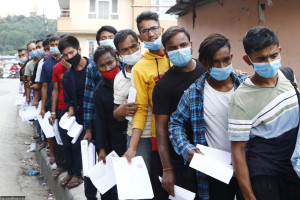Money
Cabinet set to revisit key civil aviation bills
Several top officials in the aviation industry say public confidence in flying is at rock bottom.
Sangam Prasain
After more than a year, the draft civil aviation bills have wound their way onto the agenda for the KP Sharma Oli Cabinet, with Nepal’s two largest parties—the Nepali Congress and the CPN-UML—taking decisive steps to split the country’s aviation body into two entities—service provider and regulator.
Since 2007, successive governments have proposed plans to end the aviation regulator’s dual role.
However, the bills have been languishing in obscurity, although they are vital to ensuring the safety of Nepal’s skies.
Passing the civil aviation bills would establish an independent regulator and remove Nepal from the air safety list, which has caused immense damage to Nepal’s tourism and earned the country the reputation of having a terrible aviation safety record.
“The bills were tabled at the Cabinet on Friday,” said Tourism Minister Badri Prasad Pandey. “They are on the agenda for Monday’s Cabinet [meeting]. After the Cabinet’s nod, they will be registered at the lower house.”
The Cabinet may also decide to refer the bills to committees for further review. According to Pandey, the draft bills were approved by the law and finance ministries before they were tabled in the Cabinet on Friday.
When a bill is presented, the Cabinet approves the draft legislation and its introduction to Parliament.
Minister Pandey hopes Monday’s Cabinet meeting will clear the way for his ministry to table the long-awaited bills at Parliament, before he leaves for India on Tuesday to attend the ICAO Asia Pacific (APAC) Ministerial Conference on Civil Aviation.
Pandey will address the two-day conference on September 11 at Bharat Mandapam in New Delhi, discussing the challenges and opportunities of Nepal’s aviation sector.
Nepal has earned the reputation of having a terrible aviation safety record—eight crashes—six fatal ones—taking place over the past two years, killing over 100 people.
Lawmakers have raised concerns about the government’s delay in implementing the new law, which aims to establish an independent civil aviation regulator.
The government, however, has not clarified why it is resisting the separation of the civil aviation body into clear functional entities.
The two long-pending aviation bills—the Civil Aviation Authority of Nepal Bill and the Air Service Authority of Nepal Bill—propose splitting Nepal’s aviation body into two entities, a condition for Nepal to be struck off the European Commission’s air safety list.
Tourism ministry officials say this is the fourth time they have sent the bills to the Cabinet since they were passed by the upper house in 2021. “But every time, the government changes, and the bills return,” said the ministry officials. “They have been deliberately delayed.”
The last time the bills were tabled at the Cabinet was in July 2023.
On July 16, 2023, two months before the European Union Aviation Safety Agency (EASA), the European authority for aviation safety, planned a safety audit of Nepal’s aviation system, the tourism ministry sent the draft bills to the Cabinet, seeking its ‘approval in principle’ in order to table them in Parliament.
Insiders claim the then Pushpa Kamal Dahal administration abruptly put the draft bills on hold.
On August 2, 2021, the upper house unanimously passed the two aviation bills, languishing for a year and a half as political squabbling engulfed the country. They were registered on February 23, 2020.
The bills were then sent to the Parliament Secretariat, which included them on the agenda of a meeting of the lower house scheduled for March 2, 2022.
The bills were supposed to be discussed on that day, but Tourism Minister Prem Bahadur Ale asked the Parliament Secretariat to hold them back, citing opposition from some aviation body employees to the planned fragmentation.
Two weeks later, on March 15, then-President Bidya Bhandari prorogued the federal parliament, causing the bills to go into deep storage.
A Tourism Ministry official told the Post that the then tourism minister Sudan Kirati had last year taken the initiative to re-register the bills after his predecessors—Ale and Jeevan Ram Shrestha—showed no interest in getting them passed.
The failure to pass the bills has worried experts and aviation watchdogs, including diplomatic circles.
Several top officials in the aviation industry who the Post talked to say that public confidence in flying is so low that many passengers pray to God before boarding a plane.
The 15th Joint Commission meeting of the European Union held in Kathmandu on March 19 this year underlined that air safety remains a key priority in their bilateral relations.
In 2022, in its final audit report, the United Nations aviation watchdog ICAO formally asked Nepal to split the civil aviation body into two entities.
Several aviation watchdogs, experts, and diplomatic agencies have urged Nepal to strengthen its independent regulatory body to ensure safer skies.
On April 16, 2020, the then finance minister Yuba Raj Khatiwada wrote to the Manila-based Asian Development Bank, one of the largest multilateral funding agencies, assuring that the government would facilitate a smooth transition to the two entities by approving the necessary rules to implement both Acts.
Khatiwada, who was in Oli’s Cabinet, wrote, “Establishing and maintaining an independent regulatory oversight authority, which should be separated from the service provision function, is an important safety enhancement initiative to avoid conflict of interest in accordance with ICAO'S Global Aviation Safety Plan 2020-22.”
The ministry wrote, “A service provider, which shall be separated from the oversight function, will be established as an independent organisation to focus its business domain on construction, operation and management of airports. The service provider will still remain an authority as per the bill.
“However, it would allow for private sector involvement, subject to government approval, in airports’ construction, development, operation, and management.”
The government first announced the proposal in its Three Year Interim Plan (2007-08 to 2009-10), which stated, “In the context of the completion of the study on the institutional strengthening of the Civil Aviation Authority of Nepal (CAAN), which has been working as the service provider in civil aviation, airport operator and regulator; implementation of doable recommendations suggested by the report are being considered.”
Since then, every periodic plan and policy, including the annual budget, has prioritised separating the civil aviation body. But the plan has yet to be implemented.




 28.43°C Kathmandu
28.43°C Kathmandu














